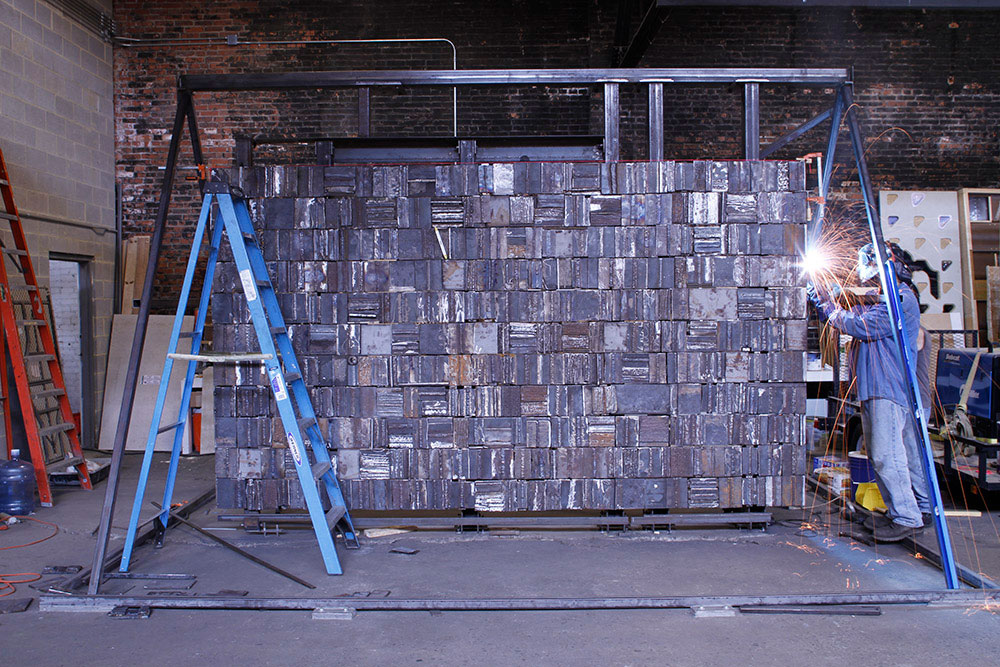
For the third time in the last four years, a Fay Jones School of Architecture and Design faculty member has been recognized with the Distinguished Professor Award by the Association of Collegiate Schools of Architecture. Peter MacKeith, dean and professor of architecture in the school since 2014, has won this top honor in the ACSA's 2023 Architectural Education Awards program.
In addition, John Folan, professor and head of the Department of Architecture since 2019, has received two ACSA awards for work executed in public interest design: the Collaborative Practice Award and the Faculty Design Award. Since arriving at the Fay Jones School, Folan has been honored with seven ACSA awards in the areas of Design Build, Collaborative Practice, Practice and Leadership, Faculty Design, and Timber Education. In addition to teaching in the Fay Jones School, Folan is the founding director of the Urban Design Build Studio (UDBS). Folan also was named the recipient of the 2018-2019 Educator Honor Award from the American Institute of Architecture Students, the most prestigious award that the AIAS confers on an educator.
In recent years, other faculty members in the Fay Jones School have won additional ACSA recognition in the areas of Collaborative Practice, Housing Design Education and Faculty Design — bringing the total honors to 18 since 2014.
"Recognition by the ACSA of faculty accomplishment at the Fay Jones School is recognition of the entire school community — all our faculty colleagues, our good students and the fundamental support of the school staff," MacKeith said. "The school has a foundational commitment to teaching: the faculty are passionately devoted to their work with students. This has been continuously inspiring to me, and is a memorable dimension of the school for our graduates of any age. In this sense, all of our faculty distinguish themselves and all our students and alumni are distinguished by their degree and lasting affiliation with the school."
"These recognitions illustrate that we have faculty who are operating at a very high level. And honestly that's a reflection of the students too. It's a culture," Folan said. "Faculty can't operate at a high level and introduce pedagogy that is recognized through those channels unless the students are capable of meeting those demands. So, it's not about individuals; it's a reflection of the culture."
Honorees in the ACSA awards program will be celebrated at the organization's 111th Annual Meeting, to be held March 30 through April 1 in St. Louis, Missouri.
Distinguished Professor Award
MacKeith is one of five educators selected this year to receive the 2023 ACSA Distinguished Professor Award. This honor recognizes individuals who have had a positive, stimulating and nurturing influence upon students and have produced a body of work that advances understanding of architecture and/or architectural education.
Since the ACSA Distinguished Professor Award was established in 1984, more than 160 professors have been recognized. Four U of A faculty members who received this award previously were Fay Jones in 1984-1985, John G. Williams in 1987-1988, Stephen Luoni in 2019-2020 and Ethel Goodstein-Murphree in 2021-2022.
MacKeith, Goodstein-Murphree and Luoni are currently among the school's teaching faculty. Goodstein-Murphree is associate dean and professor of architecture; Luoni, Distinguished Professor and Steven L. Anderson Chair in Architecture and Urban Studies, also directs the U of A Community Design Center, an outreach program of the school.
MacKeith's academic career spans two continents, three decades, five schools of architecture, thousands of students, and significant accomplishments and impact. A Senior Fellow of the Design Futures Council, MacKeith has been recognized twice by Design Intelligence as a "design educator of the year" and twice by the ACSA for "creative achievement in design education." In 2021, he was recognized by AIA Arkansas for his contributions to the architectural culture of the state; in 2014, he was recognized by the President of Finland with the Order of the Lion (knighthood) for his contributions to the architectural culture and international relations of Finland.
In his recommendation letter, Jared Davenport, an architecture student, noted the enthusiasm for teaching and high standard for education that MacKeith embodies.
"Rather than promoting a fixed perspective, Dean MacKeith asks reflective, probing questions of his students to foster the curiosity and deductive reasoning necessary to engage difficult theoretical concepts. This is a consistent theme throughout his pedagogy: to create learners and not followers," Davenport wrote.
MacKeith's work in teaching is a laminate of place-based, transferable ambitions and outcomes, framed by three intersecting sets of coordinates. The first, in design education, focuses on the international, the sustainable, and the place-based. The second, in academic and professional work, focuses on the design cultures of Finland and the Nordic region; on the design potentials of forests, timber and wood products; and on the design essentials of place, purpose and phenomena. And the third, in the academic assessments of teaching, creative practice and research, also includes service to the discipline and the public through multiple modes of cultural production (publications, exhibitions, symposia).
In his letter, Marlon Blackwell, FAIA, who has taught alongside MacKeith since 2014, said MacKeith's identity as a teacher first informs his role as dean, as he instills a student-centered culture throughout the school. Under his leadership, the school's enrollment has increased by 50 percent, with MacKeith "continuously creating new and important opportunities for students to critically engage other cultures through international experiences, to expand their understanding of suitability and environmental responsibility through timber and wood-based studios and research initiatives," Blackwell wrote.
MacKeith has made significant contributions to the understanding of Nordic architecture and architectural thought in the United States and with his students over 30 years more generally, through his studios, seminars, excursions, field trips, books, articles and curated exhibits. He teaches and presents frequently in advancing the cause of a forest-centered culture and economy. And he has effectively altered the course of the Arkansas economy and its environmental health through his impact on students, professionals, government officials and business leaders.
In her letter, Toshiko Mori, FAIA, Robert P. Hubbard Professor in the Practice of Architecture at the Harvard Graduate School of Design, said MacKeith's long-term research, teachings, publications and exhibitions on Nordic architecture have had "significant impacts," including an emphasis that architecture balance with nature in terms of siting, material use, life cycle and ecological imprints.
"This is especially poignant in Arkansas, where the relationship between forestry, lumber production, and the design and construction of architecture is both an urgent environmental issue as well as a critical long-term vision for the region's future," Mori wrote.
Faculty Design Award
Folan is one of three educators selected to receive a 2023 Faculty Design Award, which recognizes work that advances the reflective nature of practice and teaching by recognizing and encouraging creative design and design investigation in architecture and related environmental design fields and by promoting work that expands the boundaries of design through, formal investigation, innovative design process, social justice, community participation, sustainable practices, resilience, and human experience.
The award was given for "Redemption," a permanent installation at the EQT tower in Pittsburgh, Pennsylvania, that physically and tangibly represents inherent dignity, integrity and pride often unrecognized in under-represented communities. The Heinz Endowments commissioned the design and construction of a feature wall to represent its core mission areas of focus: arts and culture; children, youth and families; community and economic development; education; and environment and health.

Professor John Folan won a 2023 Faculty Design Award for the installation “Redemption.”
The work was designed and completed through a series of job skill training programs offered by PROJECT RE_, a 501c3 organization that Folan founded in 2012 and has remained executive director for since. The organization focuses on restoring communities, through reuse of materials and rebuilding lives. A component of that mission is providing certified training that promotes opportunity for living wage employment at graduation for those reentering society post incarceration. Detailed fabrication and on-site installation equipped apprentices-in-training with experience that empowered beyond basic welding certification — elevating the prospects of the recently incarcerated men, their families, and the communities where they reside.
The project is the product of a collaboration between the Urban Design Build Studio (UDBS), which Folan directs; the Trade Institute of Pittsburgh (TIP), an apprentice training program that teaches construction skills to people from the Allegheny County/Pittsburgh, Pennsylvania Municipal Region; and Construction Junction, a material repurposing center. An inclusive project implementation process aspired to educate individuals from different backgrounds about one another, while developing understanding, humility and common pride.
All material used in the construction is repurposed or recycled or is the waste byproduct of the PROJECT RE_ training programs — symbolically and literally representing redemption. The wall system employs more than 400 scrap steel blanks utilized in welding apprentice training to create a surface of aggregated aesthetic value. The wall and sub-structure were delivered to the site as complementary, prefabricated components.
The 3,800-pound weight of the steel wall required a secondary structural system to reinforce the high-rise building's primary steel frame and navigate the parameters of the site. The seamless composition is the result of a penalization strategy that relies on an integrally lapped reinforcement system, representing the reliance of a collective on the efforts of the individual — and the success of the individual on the strength of the collective.
Collaborative Practice Award
Folan was recognized with a 2023 Collaborative Practice Award, which recognizes ACSA's commitment to community partnerships in which faculty, students and neighborhood citizens are valued equally and that aim to address issues of social injustice through design.
"Deconstructing Blight," one of four winning projects, tangibly demonstrates the relationships between building systems of different utilitarian dimension — both explicit and inferred — and reveals broader structural interdependencies that influence socio-economic dimensions of dwelling.

Professor John Folan won a 2023 Collaborative Practice Award for the project “Deconstructing Blight.”
This project aimed to address dramatic shifts in regional housing needs that have occurred over the past 70 years in Allegheny County, Pennsylvania. The vertically integrated, interdisciplinary Urban Design Build Studio (UDBS) executed a pilot building deconstruction project in collaboration with the City of Pittsburgh, a regional material repurposing center (Construction Junction), and a national material reuse association (The National Building Material Reuse Association). The objective was to tangibly demonstrate the benefits, understand challenges and model procedures for the municipality, professional community, industry and broader public to replicate.
The central aspirations of the work done through Deconstructing Blight are multi-dimensional, with the concept of deconstruction being probed both literally and figuratively. Literally, the physical operation of deconstruction and material harvesting consistently results in the elimination of localized detrimental environmental effect. Figuratively, the pilot project promoted the deconstruction of pre-conceived notions through disseminated documentation, publicly accessible cost data, and an exhibition on the relationship between blight, concentrated poverty, and disinvestment in dignified housing for everyone.
Topics
Contacts
Michelle Parks, director of communications
Fay Jones School of Architecture and Design
479-575-4704,